1 人教版Language poingts in ReadingB3 UNIT1PPT课件
U1 Reading and thinking英语人教版(2019)选择性必修第四册
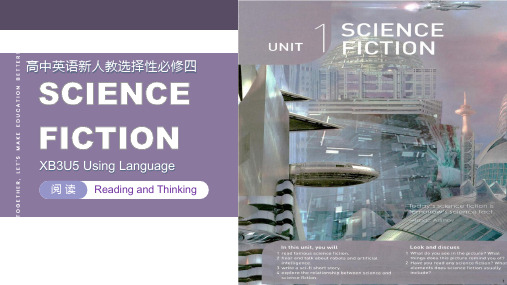
Claire’s feelings
dislike alarmed
Before Tony arБайду номын сангаасived
when she first saw him
Occasion
Para. 2 Claire didn' t want the robot in her house, especialy as her husband would be away on a business trip for three weeks, but Larry persuaded her that the robot wouldn’ t harm her or allow添加he题r to be harmed. It would be a bon添u加s.标H题owever, when she first saw the robot, she felt alarmed.His name was Tony. He seemed more like a human than a machine. He was tall and handsome with smooth hair and a deep voice, although his facial expresion never changed.
2. Will there be a robot in this novel? What type of robot will it be?
3.What does the word “adapted” mean?
Rewritten&Adjusted It is originally written by Isaac Asimov.
PART 2
人教版必修3unit 1 语言点Language poingts in Reading

4. There were over 100 guests at our wedding f_____. feast 5. The X-ray showed that the _____ bone (骨头) was broken in two places. 6. A p_____ poet is a person who writes poems. 7. The charity provides blankets and clothing (衣服) for homeless children. _________
那孩子说话的样子好像她是个大人。
12. People love to get together to eat, drink and have fun with each other.
have fun with 玩得高兴,玩得开心
Now you can have fun with your kids. 现在你可以和孩子们享受快乐时光了。 我们和Miss Lai 玩得很开心。
我妈妈奖赏了我一百块。
My mother award me one hundred yuan. My mother award one hundred yuan to me.
9. …, when people admire the moon and in China, enjoy mooncakes. admire v. 赞赏; 钦佩; 羡慕; 赞美;夸奖
She acted as though nothing had happened. 她装得好像什么事也没发生过似的。 当从句主语和主句主语一致, 从句谓 语中又含有动词 to be 时, 可以把主语 和 to be 一起省去。
It looks as if it’s going to rain.
Unit1 Period3Language Focus(课件)—高中英语(人教版2019必修第一册)
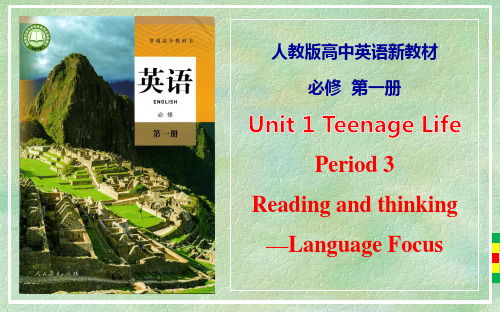
Comprehensive teaching and learning objectives
By the end of this period, the students will have been able to: 1) Learn about the usages of new words, chunks and sentence patterns and try to use them in real language situations to comprehend the text better and develop language competence; (Language competence) 2) Observe and summarize the features of descriptive language; (Learning ability + Language competence) 3) Reconstruct the text (why, what, how). (Language competence + Thinking quality)
Step2 Language Focus Activity 2 Learning about the language
(3) graduate vi.毕业于 n. 毕业生 graduate from 毕业于(某学校) graduate in 毕业于(某专业) graduation n. 毕业 on/ upon graduation 一毕业
Step2 Language Focus Activity 2 Learning about the language
e.g. I recommend buying a dictionary for your brother. If you go to Beijing, I recommend visiting the Great Wall. I recommend you to buy this dictionary. I recommend you to see this film. = I recommend you (should) see this film. 我建议你看一下这部电影。 It is strongly recommended that the machine (should) be checked every year. Please recommend him a good physician. = Please recommend a good physician to him. I should recommend it as a useful reference book.
人教版英语五年级下册u3阅读

The Magic of Reading in English: A Journeythrough Grade 5, Unit 3In the world of education, the journey of exploring knowledge never ceases to amaze. This is especially true when embarking on the adventure of Unit 3 in the Grade 5 English textbook published by the People's Education Press. This unit, rich in content and diverse in its approach, provides students with a taste of the global village while deepening their understanding of the English language.The theme of Unit 3 is as captivating as it is educational, focusing on the wonders of nature and the environment. The lessons are designed to spark curiosity and wonder among students, encouraging them to delve into the mysteries of the natural world while enhancing their reading comprehension and vocabulary skills.One of the standout features of this unit is thevariety of reading materials it offers. From engaging stories to informative texts, the selections are carefully crafted to engage students' imaginations and expand their cultural horizons. The stories are not just about facts andfigures; they are about exploring the beauty of nature and understanding the importance of protecting it.The vocabulary introduced in Unit 3 is not just limited to academic terms. Instead, it includes words and phrases that are relevant to real-life situations, making the learning process more relatable and enjoyable. This approach not only helps students retain information better but also encourages them to apply their knowledge in everyday scenarios.The exercises and activities accompanying the readings are equally engaging. They are designed to test students' comprehension skills and encourage them to think critically about the material they have read. The activities range from simple comprehension questions to more complex tasks that require students to analyze and interpret information. The cultural aspect of Unit 3 is also noteworthy. By introducing students to different cultures and traditions, the unit promotes cultural awareness and respect. It encourages students to appreciate the diversity of the world and understand that every culture has its unique contributions to make.In conclusion, Unit 3 of the Grade 5 English textbook published by the People's Education Press is a comprehensive and engaging resource for students. It combines the joy of reading with the acquisition of knowledge, fostering a love for learning that will last a lifetime. As students delve into the wonders of Unit 3,they embark on a journey that is both educational and enlightening, paving the way for a brighter future.**阅读之旅:人教版英语五年级下册第三单元的魅力** 在教育的世界里,探索知识的旅程总是令人惊叹不已。
【课件】Unit+3Reading+for+Writing人教版(2019)必修第三册

Tourist attractions:
…, which was built using… ViWsithoarst fceaantuarlseos sthpeentdohuoriustrsaettxrpalcotrioinng?… …iWs ahlastocaankevyissiittoer,swdiothth…edreo?ing … …is a great place to see, such as… …is a place…, where visitors can…
新教材高中英语人教版
B3 U3 Reading for Writing
听力
incident
extensive广阔的 wisdom
grocery
be intended for... essat of... an/the introduction tob..a.ck-up plan备份计划brave/
But perhaps what many tourists and San Franciscans treasure most about Chinatown is its food. There is Chinese food to suit everyone’s taste, with traditional dishes from all over China.
Tip 3: Proper verbs are highly recommended.
Para 3: Detailed information of San Francisco Chinatown
Most of Chinatown was destroyed in the 1906 earthquake, but the city and residents rebuilt it, taking care to include lots of Chinese architecture. Traditionally, visitors enter Chinatown through the legendary Dragon Gate, which was built using materials donated from China. Other famous sites include the Tin How Temple and Bank of Canton, to name but a few. Visitors can also spend hours just exploring the interesting sights, smells, and sounds of China. Portsmouth Square is also a key site, being the center of Chinatown. It has a long and famous history, with the author Robert Louis Stevenson having spent much time writing there. These days, the square is a great place to see traditional Chinese culture in real life, such as games of Chinese chess, and people practicing tai chi.
Unit1 Art Using Language 读写部分语言点课件-高中英语人教版选择性必修第三册

【即学即用】
他提出了一个很值得考虑的建议。 ①He came up with a suggestion which was well worth considering/consideration ② He came up with a suggestion which was well worthy of being considered/to be considered
【即学即用】
①Water expands
(expand)as it freezes .
②The rapid expansion (expand) of cities can cause some
problems .
翻译句子
③He came to say goodbye to me even though it was raining .
尽管他很忙,他还是愿意帮我们。
★ expansion n .扩张;扩展;扩大
This book is an expansion of a series of lectures given last year . 这本书是去年举行的系列讲座的扩充。
【合作探究】
阅读下列句子,写出句中黑体词的词性、词组和含义
说一说.勤归纳
记一记,长知识
give sb a guarantee that ...向某人保证…… Can you give me a guarantee that the work will be finished on time ? 你能向我保证工作会按时完成吗?
【即学即用】
①Your watch will be repaired free if it ' s still under guarantee . ②If he works harder , he is guaranteed to succeed( succeed ). 句型转换 ③Sorry , I can ' t give you a guarantee that you will get the position . → Sorry , I can ' t guarantee you the position.
高中英语 Language points in Reading课件 新人教版选修7

up to 多达, 直到……, 胜任, 由……负 责/决定 be up to sth = be busy doing sth. 忙于,
it’s up to sb. to do sth. 由某人负责做某 事 be up to = be fit for 胜任(常用于否定 句和疑问句中)
10
up to 多达, 直到……
13
imaginative adj. 富有想象力的, 爱想象的 an imaginative child/writer有 想象力的孩子/富有想象力的作家 imaginary adj. 想象中的, 假想 的
14
imaginable adj. 可想象的 imagine v. 设想 imagination n. 想象力 image n. 雕像, 肖像,形象
Language points in reading
1
• 1.hear from sb.: receive a letter from sb.
• 收到……的信 • I look forward to hearing from you. • hear of: 听说 • Who's he?--I've never heard of him. • 他是谁?──我从没听说过他。 • hear about :听到关于……的消息
12
for sure:一定,必定
He will come back for sure. it /that. is for sure 那是肯定无疑的 know sth. for sure 知道……肯定无疑 很快他就会找你帮忙,那是肯定没有疑问
的。
Soon he will turn to you for help and that’s for sure .
人教版新课标必修三Unit1 Learning about languageandusing lan
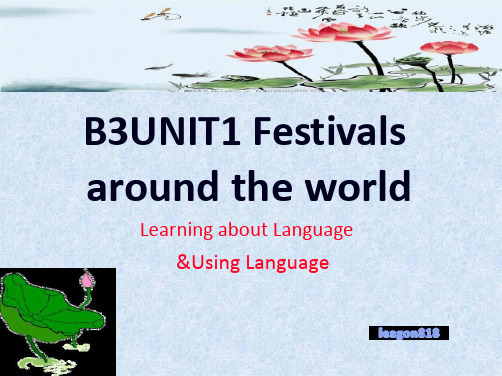
? 3.Why didn't Li Fang meet Hu Jin? ? A.Hu Jin broke her word. ? B.Li Fang didn't wait long enough.
? C.They waited for each other at different places. ? D.Li Fang watched TV and forgot the appointment.
answers.
? 1.How did the Goddess of Heaven feel when
she knew her most lovely granddaughter had got married to a human secretly?
? A.Glad.
B.Angry.
? C.Disappointed.
? set up 竖起,搭起;建立
? set about doing sth. 着手做某事
? set out to do 着手
? During the Spring Festivals ,people set off fireworks to celebrate the New Year.
? 第三十一届奥运会举办得很成功。 ? ③He ______my suggestion ,which made me
very upset. ? 他拒绝了我的建议,这使我很伤心。 ? 答案①up ②out ③ turned down
? 3.keep one's word 守信用,履行诺言
? (教材原句 P7)She said she would be there at seven o'clock ,and he thought she would keep her word.
人教版必修第三册Unit3 Reading for Writing 名师教学设计2
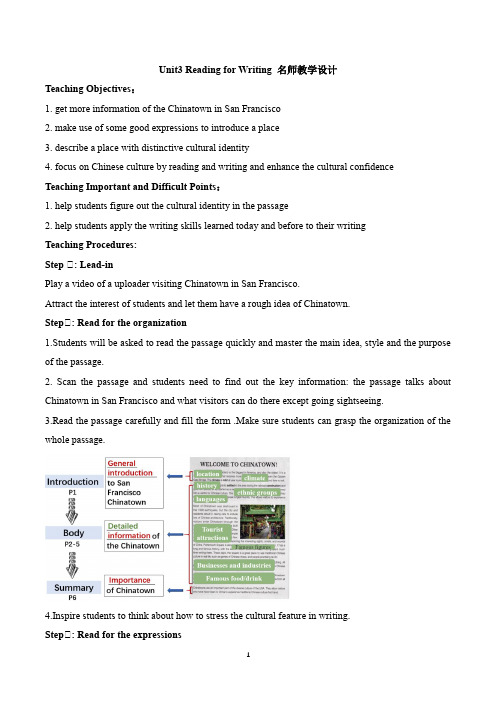
Unit3 Reading for Writing 名师教学设计Teaching Objectives:1. get more information of the Chinatown in San Francisco2. make use of some good expressions to introduce a place3. describe a place with distinctive cultural identity4. focus on Chinese culture by reading and writing and enhance the cultural confidenceTeaching Important and Difficult Points:1. help students figure out the cultural identity in the passage2. help students apply the writing skills learned today and before to their writingTeaching Procedures:Step Ⅰ: Lead-inPlay a video of a uploader visiting Chinatown in San Francisco.Attract the interest of students and let them have a rough idea of Chinatown.StepⅠ: Read for the organization1.Students will be asked to read the passage quickly and master the main idea, style and the purpose of the passage.2. Scan the passage and students need to find out the key information: the passage talks about Chinatown in San Francisco and what visitors can do there except going sightseeing.3.Read the passage carefully and fill the form .Make sure students can grasp the organization of the whole passage.4.Inspire students to think about how to stress the cultural feature in writing.StepⅠ: Read for the expressions1.The author introduces the place objectively and comprehensively. Read the passage again and findout the useful expressions to help in writing.2.Collect the expressions in the way of words and sentence patterns.3.Fill the blanks and check the detailed information while students will be encouraged to imitate thesentence pattern by making sentences.StepⅠ: Get ready for writing1.introduce Hang Zhou by a video. Let students put down some information they can use in writing.2.Present a mind map of Hangzhou according to the items mentioned in the reading passage. Studentswill be divided in groups to discuss about the different items about Hangzhou and finish the mind map together.3.Show them an extra ppt referring to the landscapes and food in Hangzhou. If necessary, they canmake some notes.StepⅠ: Writing1.make an example of how to start describing a place.2.Show students the way to imitate the paragraph in the reading passage.3.Remind students to refer to the passage they have learned before—how to describe a place.4.Enable them to complete the whole writing by imitation.5.Show them a possible sample for reference and a possible short passage for examination.。
人教版高中英语必修三UnitLanguagepointsinReading教学课件

人教版高中英语必修三UnitLanguagep ointsi nReadi ng
【分析】
a. 此复合句的主句为What it was to
become was uncertain;从句为_____引导
的定语从句。
when
b. 主句中包含一个由what引导的主语从 句What it was to become。
人教版高中英语必修三UnitLanguagep ointsi nReadi ng
这句话还可以这样表述: Nobody knew what the cloud of dust would become before it turned into a solid globe between 4.5 and 3.8 billion years ago.
人教版高中英语必修三UnitLanguagep ointsi nReadi ng
【归纳】 give birth to后可直接跟名词,意为 “分__娩___” (句1和句2),也可意为 产生 “_____”(句3)。 【拓展】 at birth 出生时 since / from birth 自出生后 date of birth 出生日期
人教版高中英语必修三UnitLanguagep ointsi nReadi ng 人教版高中英语必修三UnitLanguagep ointsi nReadi ng
Unit 4
1. What it was to become was uncertain until between 4.5 and 3.8 billion years ago when the dust settled into a solid globe. 随后它会变成什么没人能知道,直 到38-45亿年前,这团尘埃才慢慢地 形成一个固体的球状物。
高二英语人教版 选择性必修三 Unit 1 Learning About Language

is art?”
4
主
系
the best way to understand
1
Western art
is
2 the purpose of Western art
was
3
Monet’s aim
was
4 What they attempted to do
was
表 to look ... to teach ... to convey ... (to) show ...
动词不定式(短语)作表语
动词不定式(短语)作表语
表意功能及主要用法:
➢ 当不定式作表语时,能够担当句子主语的名词比较有限,它们大多用于表 示某种情形或状况,包括advice、aim、ambition、custom、business、desire、 difficulty、duty、experience、habit、happiness、hope、idea、intention、job、 method、plan、principle、problem、purpose、reason、risk、role、task、 thing、wish等。
• My ambition is to become a scientist. • His habit is to get up early. 有时,根据表达的需要,在作表语的不定式前,还可添加疑问代词或疑问副 词,包括what、who、how、when、where等。 • The problem was how to begin.
In groups, brainstorm words and phrases concerning art and then make a mind map to connect them.
高一英语人教版必修3教案:Unit1UsingLanguage:Extensivereading+Word版含解析
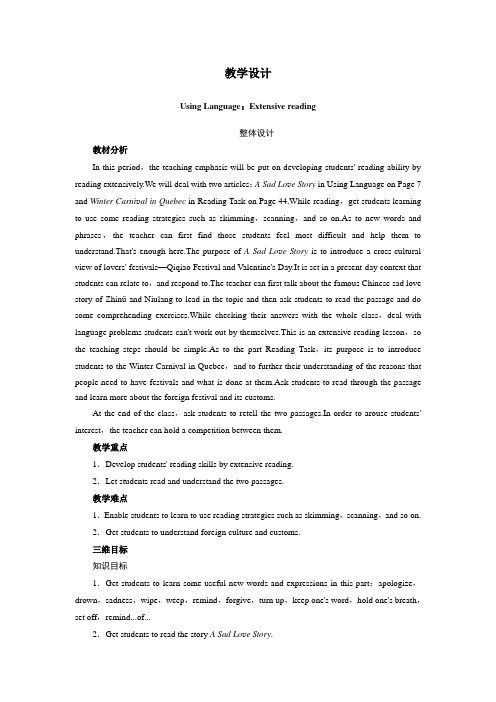
教学设计Using Language:Extensive reading整体设计教材分析In this period,the teaching emphasis will be put on developing students' reading ability by reading extensively.We will deal with two articles:A Sad Lo v e Story in Using Language on Page 7 and Winter Carni v al in Quebec in Reading Task on Page 44.While reading,get students learning to use some reading strategies such as skimming,scanning,and so on.As to new words and phrases,the teacher can first find those students feel most difficult and help them to understand.That's enough here.The purpose of A Sad Lo v e Story is to introduce a cross-cultural view of lovers' festivals—Qiqiao Festival and Valentine's Day.It is set in a present-day context that students can relate to,and respond to.The teacher can first talk about the famous Chinese sad love story of Zhinü and Niulang to lead in the topic and then ask students to read the passage and do some comprehending exercises.While checking their answers with the whole class,deal with language problems students can't work out by themselves.This is an extensive reading lesson,so the teaching steps should be simple.As to the part Reading Task,its purpose is to introduce students to the Winter Carnival in Quebec,and to further their understanding of the reasons that people need to have festivals and what is done at them.Ask students to read through the passage and learn more about the foreign festival and its customs.At the end of the class,ask students to retell the two passages.In order to arouse students' interest,the teacher can hold a competition between them.教学重点1.Develop students' reading skills by extensive reading.2.Let students read and understand the two passages.教学难点1.Enable students to learn to use reading strategies such as skimming,scanning,and so on.2.Get students to understand foreign culture and customs.三维目标知识目标1.Get students to learn some useful new words and expressions in this part:apologize,drown,sadness,wipe,weep,remind,forgive,turn up,keep one's word,hold one's breath,set off,remind...of...2.Get students to read the story A Sad Lo v e Story.3.Let students know more about the Quebec Carnival.能力目标1.Develop students' reading skills by extensive reading and enable them to learn how to use different reading skills to read different reading materials.2.Enable students to tell about Qiqiao Festival and Valentine's Day.3.Let students tell about the Quebec carnival with their own words.情感目标1.Stimulate students' love of Chinese festivals and culture by learning foreign culture and custom.2.Develop students' sense of group cooperation and teamwork.教学过程Step 1 Revision1.Check the homework exercises.2.Ask some pairs of students to come to the front and act out their dialogues to review and practice the expressions for requests and thanks.Step 2 Warming up by brainstormingCan you tell something about Chinese Qiqiao Festival?Can you tell something about Valentine's Day?Have you read any love stories? What are they?Step 3 Reading1.Reading and judgingAsk students to read the passage fast and then decide whether each of the following statements is true or false.1)The girl Li Fang loved and waited for didn't turn up,but he didn't lose heart.2)Because her granddaughter got married to a human,the Goddess of Heaven got very angry.3)Zhinü was made to return to Heaven without her husband.They were not allowed to meet forever.4)Hu Jin had been waiting for Li Fang for a long time with a gift for him.Keys for reference:1)F2)T3)F4)T2.Reading and answeringAsk students to read the passage carefully,and answer the following questions.1)Why did Li Fang feel like a fool?2)What was Li Fang afraid that Hu Jin was doing?3)How did Li Fang know the manager wanted to shut the coffee shop?4)What is the reason why Li Fang and Hu Jin did not meet on time?5)Why was Li Fang so worried at the end of the story?3.Check the answers with the whole class and deal with any language problems.Keys for reference:1)Li Fang felt like a fool because he thought that he was waiting without any hope./Hu Jin wouldn't come to meet him.2)He was afraid that she was with her friends laughing at him.3)The manager wiped the tables,and then sat down and turned on the TV.4)They didn't meet on time because Li Fang waited in the coffee shop while Hu Jin in the tea shop.5)He was worried because he had thrown away the roses and chocolates/presents/gifts for Hu Jin and he had nothing to give her and he thought she would not forgive him.4.Reading and findingAsk students to read the passage aloud to the tape and underline all the useful expressions or collocations in the passage.Let students read them aloud and copy them down in their exercise book after class as homework.Collocations:be heart-broken,Valentine's Day,a coffee shop,after work,turn up,laugh at,keep one's word,look forward to,hold one's breath,drown one's sadness in coffee,the Goddess of Heaven,the weaving girl,on earth,the herd boy,fall in love,get married,be married to,the Milk Way,once a year,be able to,set off,throw...away,remind...of,...Step 4 Discussion1.After students' reading the passage,ask them to work in groups and discuss the following questions:1)Why was the TV story what Li Fang needed?2)Why do people want the weather to be fine on Qiqiao Festival?3)What more do you know about Qiqiao Festival?4)Are you satisfied with the ending of the story? If not,how are you going to rewrite it?2.Ask students to start their discussion.Make sure that every student has a chance to express his/her ideas.3.Ask each group to choose one student as their representative.Let as many group representatives as possible come to the front and give a report of what their group has discussed.Step 5 Reading TaskTell students:We have learned some knowledge of festivals around the world from the reading passage Festi v als and Celebrations.We have also learned about the Trinidad Carnival.Do you want to know about the Quebec Carnival? Please turn to Page 44 and read the passage Winter Carni v al in Quebec.1.Ask students to read the passage fast to get the general idea.2.Let students read the passage carefully and then answer the following questions.1)Why do you think that dogs are used to pull sleds in cold climates?2)Which activity at the Carnival do you think would be the most fun? Why?3)Which activity at the Carnival do you think would be the most dangerous? Why?4)If you could go to the Quebec Carnival,what would you do or see? Why?5)If you had to draw a poster for the Carnival,what things would you put on the poster?6)What would you wear if you went to the Carnival? Name at least three things.3.Check the answers with the whole class after most of them finish.Keys for reference:1)Dogs are used in cold climates because they can run on top of the snow,which horses cannot/because they have very thick fur which keeps them warm.They are also very strong/do not eat grass and grain as horses and cattle do/can be fed on meat/do not eat too much.2)Students give their own answers.3)Probably the canoe race through the ice would be the most dangerous.4)Students give their own answers.5)Students give their own answers.6)I would wear a warm coat/jacket/hat/gloves/mittens/boots/underwear/scarf/socks.4.Have students compare Harbin with Quebec.1)Talk about Harbin with students.What do you know about Harbin?2)Let students fill in the chart.City Similarity DifferenceHarbinQuebecStep 6 Important language points1.But she didn't turn up.可她却不见人影。
- 1、下载文档前请自行甄别文档内容的完整性,平台不提供额外的编辑、内容补充、找答案等附加服务。
- 2、"仅部分预览"的文档,不可在线预览部分如存在完整性等问题,可反馈申请退款(可完整预览的文档不适用该条件!)。
- 3、如文档侵犯您的权益,请联系客服反馈,我们会尽快为您处理(人工客服工作时间:9:00-18:30)。
14
She is ___ in red today and looks very beautiful. A. wearing B. having on C. dressing D. dressed
2
take place 通常指有计划, 或事先安排好的发生,没 有偶然性。
3
Great changes ___ in the rural
areas in the last two decades.
A. have taken place
B. took place C. have been taken place D. are happening
belief 通常用作不可数名词
religious beliefs 宗教信仰
Several members hold very strong political beliefs.
有些成员有着强烈的政治理念。
11
6.dress up ①dress sb 给某人穿衣服”。 当表示自己穿衣服时, 则用反身代词 dress oneself
12
Wake up children and dress them. 唤醒孩子, 给他们穿上衣服。 ②get dressed动作
be dressed状态 get dressed/ be dressed in+衣服/颜色 穿何种衣服
13
Harry up and get dressed. 快点穿上衣服。
5
2) starve for sth / were starved for sth 3) 渴望获得某事物 4) 5) The homeless children were starved
for love. 这些无家可归的孩子渴望得到爱。
6
3) to feel very hungry 感觉很饿。仅用于 进行时态be starving When will dinner be ready? I’m starving. 晚饭什么时候做好?我快饿死了。
21
10. as though/as if好像/仿佛
1I)t与lo现ok在s a事s i实f i相t w反er,e g从oi句ng谓to语ra动in词. 用一 般看过上去去时天(要d下id/雨be。动(词事用实w上er不e)下) 2H)与e b过eh去av事ed实a相s if反n,oth从in句g 谓ha语d h动a词pp用en过ed. 去完成(had done) 他表现的若无其事。 3)与将来事实相反,从句谓语动词用 would/could/might+do.
人教课标版 高一 必修 3
Unit 1
1
1. take place 发生;举行 ① In 1919,the May 4th Movement took place in China. 1919年,中国发生了“五四”运动。 ② Great changes have taken place in this village. 这个村庄发生了巨大的变化。
his good friend. • 为了纪念他的挚友,他写下了这一
首长诗。
9
in +n.+ of 构成的短语
• 纪念,向……表示敬意 • in honour of • 支持 • in support of • 负责,主管 • in charge of • 寻找 • in search of
10
5.belief (n.):信任;信心; 注意:
7Байду номын сангаас
3.origin (n.) 起源;由来,可用做可数名 词或不可数名词,通常用作复数形式。 The tradition has its origins in the Middle Ages. 这个传统发源于中世纪。
8
4. in memory of
• in memory of 纪念,追念 • He wrote a long poem in memory of
15
7. awards award. n. 奖, 奖品 v. 判给, 授予award sb. sth. 奖赏某人某物
16
辨析: award 和reward: award后接双宾语 award sb. a metal 授予某人奖章 reward 奖赏, 给…报酬, 不能接双宾语; reward sb. for sth. 因 …奖赏某人; reward sb. with sth. 用某物酬劳某人
用力想啊!
17
She rewarded herself with a cup of coffee after a whole morning’s hard work.
一上午的刻苦学习后, 她冲一杯 咖啡来奖赏自己。
18
8. admire admire v. 意为“赞赏;钦佩;羡慕;赞美;夸奖”
注意: 表示“在某方面钦佩某人”用“admire sb. for sth.” We all admire him for his courage and bravery. 我们都钦佩他的勇气和胆识。
19
9. look forward to look forward to (doing) sth. 意为期待 着(做)某事, 其中的to是介词, 而不是 动词不定式符号。
20
Children are looking forward to Spring Festival.
孩子们渴盼着过年。 He’s looking forward to hearing from his pen pal. 他期待着笔友来信。
大家注 意了!
take place不能用于被动语态中,句
中短语 in the last two decades 可确定
句子的时态为现在完成时。
4
2. starve (v.) →starvation (n.)
1) 挨饿;饿死 Millions of people starved to death during the war. 战争中数百万人挨饿至死。
